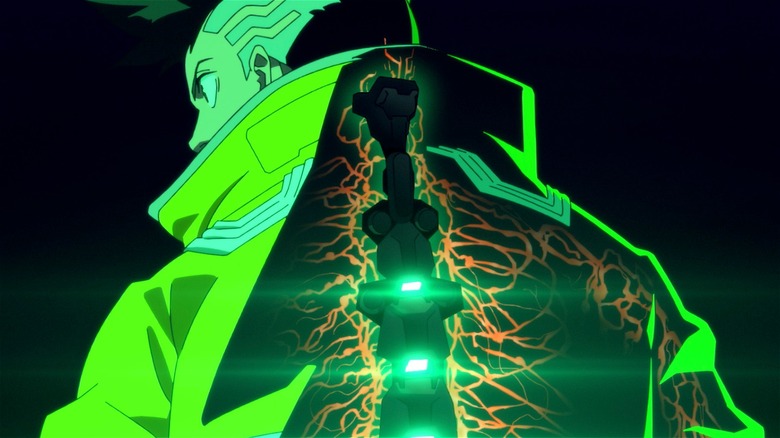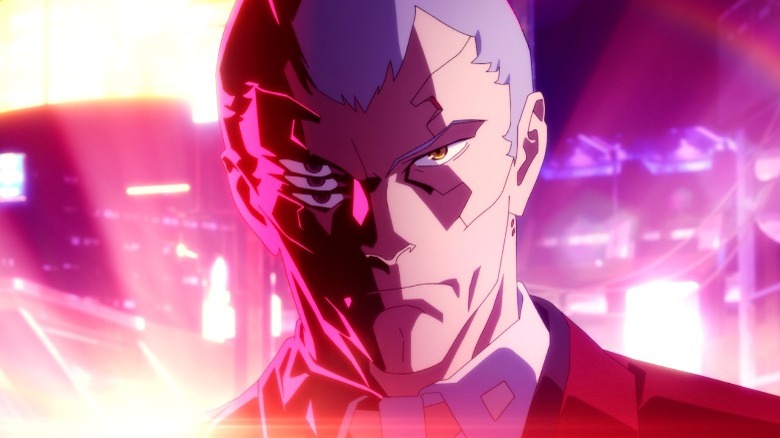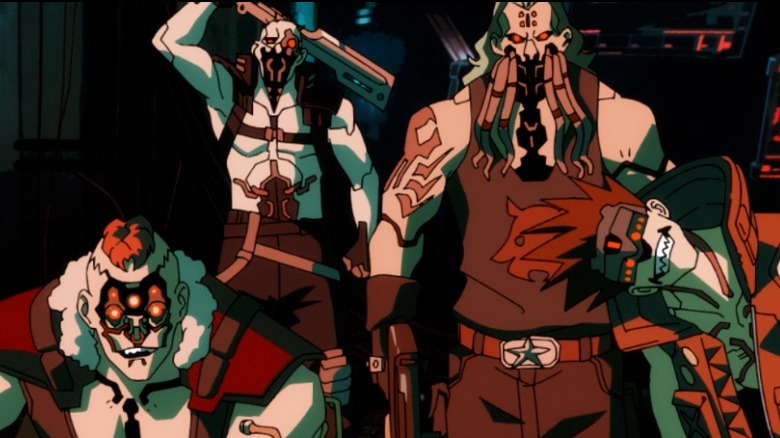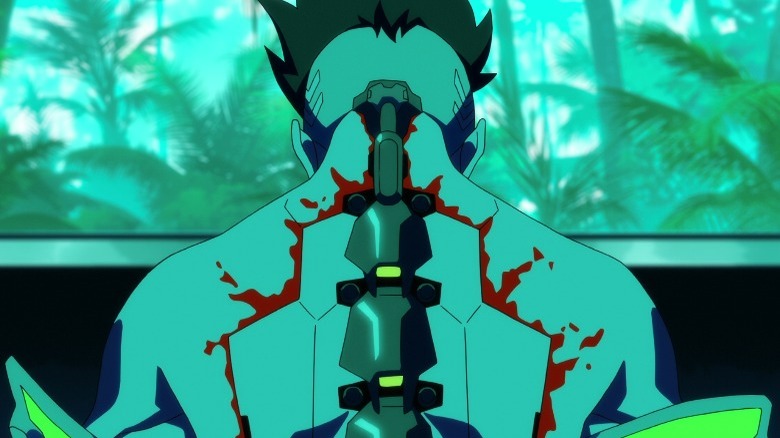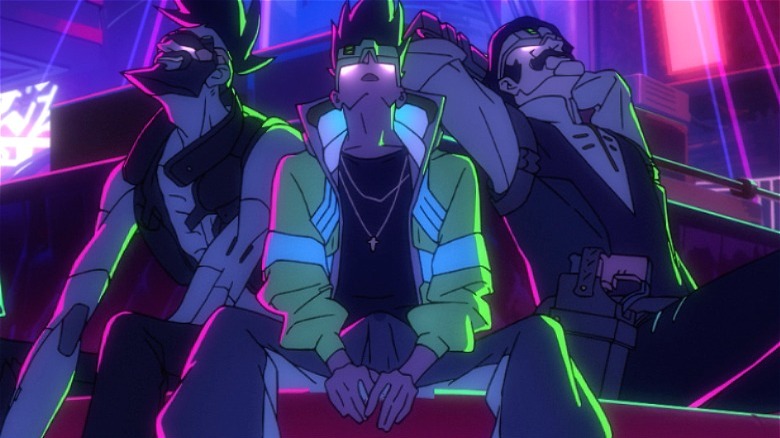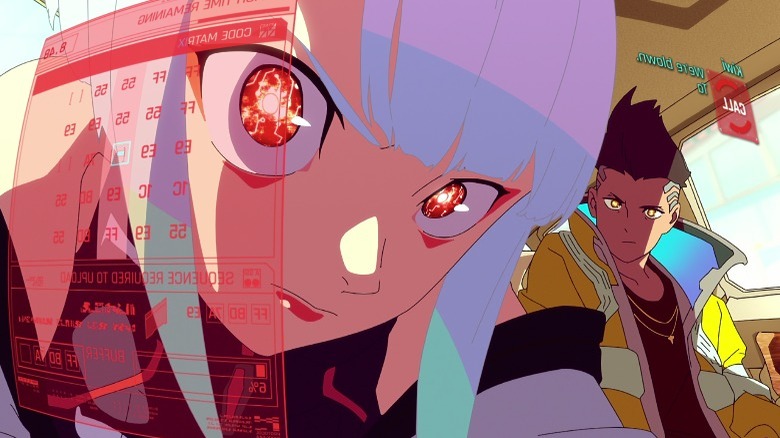Cyberpunk: Edgerunners: A Guide To The World And Words Of The New Netflix Series
The legacy of video game adaptations is a complex one, as most attempts to create standalone stories based on massively popular video games have failed on some fundamental level. Thankfully, there have been some exceptions in the recent past, which include Netflix's "Arcane" (based on "Arcane: League of Legends") and "Tekken: Bloodline" (based on the popular "Tekken" franchise). So, when CD Projekt Red announced a standalone anime series titled "Cyberpunk: Edgerunners," based on the mega-hyped "Cyberpunk 2077," fans of the open-world game were cautiously hopeful. Netflix dropped the series today, and I have good news for you: "Cyberpunk: Edgerunners" brings the world of the game to life in the best of ways.
While fans of "Cyberpunk 2077" will rejoice at the anime's dedication to the game's in-world lore, aesthetics, and core concepts, those unfamiliar with the original source material might feel a little lost at first. What exactly does the protagonist, David Martinez, mean when he says he's watching a Braindance? Why are all the characters in "Edgerunners" so hell-bent on dismantling Arasaka, the mega-corporation that has a tight hold over Night City? While the anime does a solid job of explaining these concepts as the plot evolves, some in-game context might help enrich our understanding of character motivations and how the world of "Cyberpunk" works.
Here's a guide to the core concepts and terminologies that saturate the world of the game and the anime, and what they mean in the context of "Cyberpunk: Edgerunners."
A futuristic world over-reliant on cybernetics
"Cyberpunk: Edgerunners" opens with David, a street kid who lives in Night City with his mother, set to become a corporate professional for the Arasaka Corporation. While Night City appears to be a safe haven for those who want to outrun their past and make it big, it is a capitalist megapolis overrun with crime. The gulf between the rich and the poor widens over time, as folks like David's mother have to overwork themselves to barely make ends meet. It is easy to be lulled by Night City's neon skyscrapers and bustling nightlife, but the truth is far more unsavory: it is a hellscape for the disenfranchised. The only escape is to either move away or move up the ranks, which is never easy.
Due to the technological advancements of the world, almost every citizen has some sort of cybernetic implant, which offers some sort of advantage that their organic bodies do not. While some chips and implants allow increased resistance to gunfire or physical attacks, others enhance biological processes in terms of eyesight, immune system, and more. The extent of cyberware intrusion in the human body is tremendous, as folks can even modify their nervous systems, install a new operating system with mods, and integrate weapon systems into their limbs. But only if they can afford to do so, of course.
As cybernetic enhancement is extremely dangerous and invasive, experts known as Ripperdocs are usually the ones to carry out these procedures. An over-reliance on cyberware has its downsides for sure, as modifying your organic body beyond its limits can break your mind, body, and soul. But that does not stop those who dare to dream and make it big in Night City.
There's always a turf war in Night City
Here are some of the major groups battling it out to reign over Night City.
Arasaka: A megacorporation dealing in corporate security, banking, and manufacturing. Massively influential and ruthless, Arasaka rules over Night City with no mercy, with the aid of connections to the military, crime families, and powerful middlemen. The company harbors dark secrets due to its unethical practices and has a wide-ranging network of lawyers, assassins, and armed forces to keep errant groups in check.
Cyberpunk, or Edgerunners: Edgerunners are a group of mercenary outlaws who skirt the edge of legality. Also known as Cyberpunks, these people earn a living by running gigs in Night City. The kind of Edgerunner you are depends on your skill set. If you're good at gunning people down during high-stakes gigs, like David, you're simply a merc for hire, and if you have a gift for biohacking and are adept at stealing data, you're a Netrunner (like Lucy). Then there are the Fixers, who are middlemen that hire outlaw groups for prospective gigs. Edgerunners might take up any gig as long as it pays them, or be devoted to a certain ideology.
Militech: Another megacorporation specializing in weapons manufacture/military contracts. As the biggest rival of Arasaka, the two groups constantly battle it out for corporate hegemony. "Edgerunners" incorporates this rivalry into David's storyline, painting a picture of how middlemen are used as mere pawns in a dangerous socio-political war for power.
Criminal Gangs: There is an overabundance of gangs in Night City who carry out their own covert business and act as mercs for anyone willing to pay them. Examples include the dangerous Maelstrom gang, Tyger Claws, Animals, and The Voodoo Boys, who are referenced both in the game and the series.
Cyberpsychosis is at the heart of Night City's many problems
Both in "Cyberpunk 2077" and "Edgerunners," cyberpsychosis is a major problem that plagues Night City. Cyberpsychos are humans who are afflicted with a mental illness due to excessive use of cyberware, which eventually drives them to the edge of psychosis. There's an essential loss of identity, as an over-reliance on cyberware induces instability, anxiety, and narcissistic tendencies. Cyberpsychos are considered dangerous and impulsive, as shown in the series and the game. Sadly, there's no treatment for the condition, and most cyberpsychos end up dying due to intervention by authorities or during shootouts during high-risk missions.
David starts off as a kid with almost no implants, which is understandable, as he does not have the necessary funds for the surgery. After he is forced to be an edgerunner, he turns to more invasive implants, including the highly unstable Sandevistan, which grants him superhuman speed and agility. Although David is able to withstand the effects of continuous use, symptoms of cyberpsychosis soon set in. It starts with a slight tremor in the hands, and a gradual feeling that he's somehow "special" and meant to emerge at the top. His teammate, Maine, battles intense cyberpsychosis, and tragedy ensues. David follows a similar trajectory, and becomes more aloof as time progresses.
This is heartbreaking, as David's accumulated guilt/trauma associated with his mother's death sets him on a path of self-destruction. The only way to manage this accelerated deterioration is to dial back on cyberware use, and David does not do that. He needs to become a legend in Night City. And he does, at great personal cost.
What the hell is a Braindance, choom?
Language is a constantly evolving organism, which allows the residents of Night City to develop their own set of slang and specific terminology. While there are countless terms and slang words to go through, here are some of the most-used terms in "Edgerunners":
Braindance, or BD: A video log of a person's experience that can be viewed as in VR/AR form. BDs are visceral, as it allows the viewer to experience the senses, emotions, and psychology of the person it belongs to. While BDs are mostly for entertainment, it is easily abused as a drug of sorts, as it offers a voyeuristic window for thrill without real danger. Viewers can also rewind, play, analyze, and dissect BDs to garner more information about a scenario, as V does in the game several times. It's similar to the VR experience in "Strange Days."
Eddies: Short for Eurodollar, Eddies basically equals to money in Night City.
Chrome: Informal slang for cyberware, including chips and implants.
ICE: Short for Intrusion Countermeasures Electronics, which is a type of software program used by netrunners to prevent security breaches. As anyone can remotely hack into your mainframe and short-circuit you, it is important to have a complex security system in place.
Preem: Slang for premium, and simply means cool, awesome, or dope. Both V and David use "preem" multiple times during their interactions.
Choom: Street-slang for friend; equivalent to "buddy" or "my dude."
Corpo: A corporate employee, used in a derogatory sense, as it denotes a soulless, corporate sellout.
Flatline: To kill or die.
Gonk: "Edgerunners" features this slang heavily. It means fool or idiot, and is usually said as a term of endearment.
Delamain: An AI that runs a taxi company named Delamain Corporation.
In-game elements that are featured in the anime
"Cyberpunk: Edgerunners" is extremely faithful to the interface and mechanics of "Cyberpunk 2077." Prime examples are the way in which calls are visualized, with the caller's name in the left corner, and their conversation typed out in the same font that the game uses. Apart from this, we see various locations that serve as gig-points for the player character in the game, including Afterlife (a legendary nightclub) and Lizzie's Bar. Some setups in the anime are directly mirrored from the game. For instance, the layout of David's first apartment is very similar to V's Megabuilding H10 home base, which features a bed in the left-hand corner, a living space in the middle, and a shower/toilet area in the right.
One aspect of the series that is not as explicitly spelled out is Street Cred. Street Cred is a yardstick of reputation for mercenaries, and a higher rung allows them access to premium or high-stakes gigs. Making a name for yourself is difficult in Night City, and in order to be a legend, one has to work their way toward building a solid reputation. We see this in the show as David's street cred "levels up" after another character's death.
There is some cool attention to detail when it comes to bringing the world of Night City to life. A cool in-game callback is the manner in which Cremation Services work. David receives the ashes of a loved one digitally, and a monotonous AI voice greets him with the most superficial of condolences. While Cremation Services help extract bodies and deliver them to loved ones, the manner in which it transpires is removed from genuine human empathy, as everything is thoroughly automated.
Despite its futuristic concepts, Cyberpunk's world feels intuitive
There's an expected level of alienation one senses when exploring the world of "Cyberpunk," but that is understandable, even necessary. After all, the futuristic, mega-capitalistic society of Night City is not something we should aspire to, but something to examine closely to identify our present socio-political ills. Despite the cautionary nature of the world, there's something about its mechanics that feels fairly intuitive. For instance, viewers who binge-watch "Edgerunners" with no prior knowledge of "Cyberpunk" will understand what Max-Tac is right away: it is a special operations team that deals with people who are considered to be dangerous. Other concepts include a health stim, which is a temporary health boost of sorts that we see the characters use when they're injured during missions.
The true appeal of "Cyberpunk: Edgerunners," however, is its intensely human narrative about characters who have loved and lost. David emerges as a protagonist worth rooting for, even when he makes decisions that are not in his best interests. Despite the excessive cyberware galore, the character arcs are driven by stark human motivations, often fueled by trauma and the need to escape a cruel and ruthless world. There's a love story at the heart of "Cyberpunk: Edgerunners," which is neither commodified nor used as a mere plot point just for the sake of it. In a world rife with cyborgs looking to make it big, humanity still exists, no matter how warped or evolved that notion is.
"Cyberpunk: Edgerunners" is currently streaming on Netflix.
